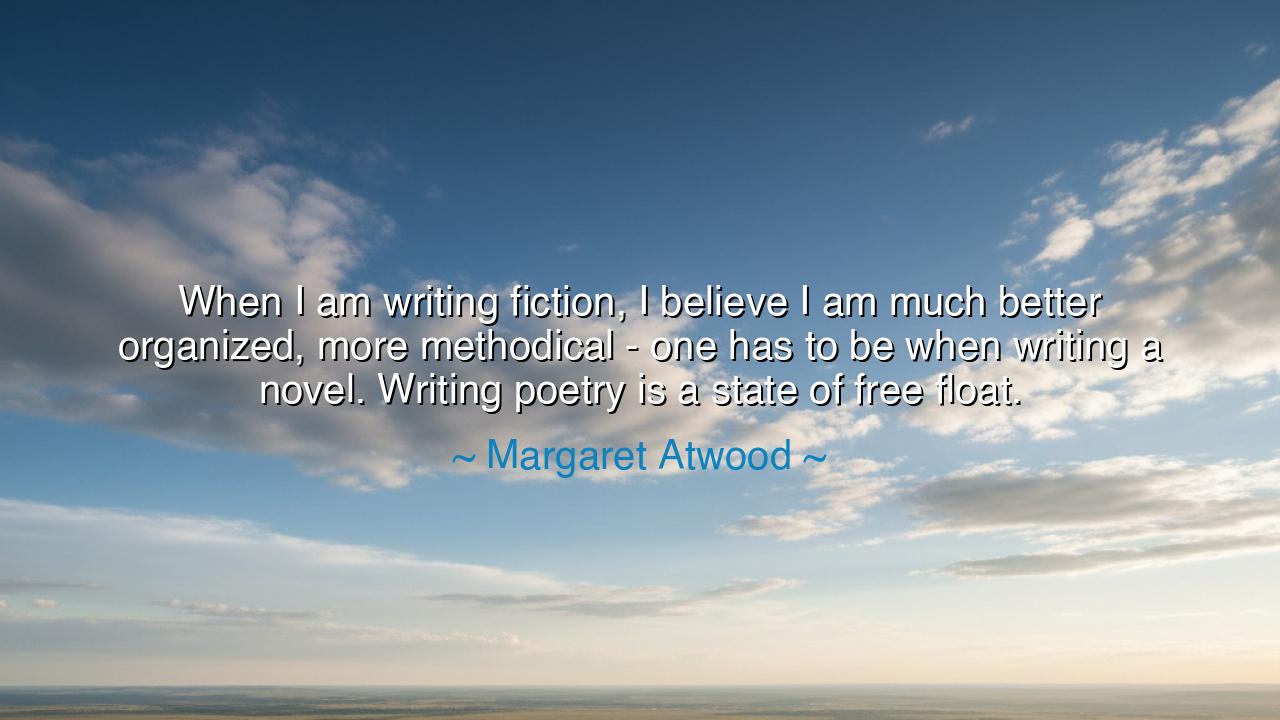
When I am writing fiction, I believe I am much better organized
When I am writing fiction, I believe I am much better organized, more methodical - one has to be when writing a novel. Writing poetry is a state of free float.






Hear, O seekers of words and wanderers of thought, the wisdom of Margaret Atwood, who confessed: “When I am writing fiction, I believe I am much better organized, more methodical—one has to be when writing a novel. Writing poetry is a state of free float.” In this saying she unveils the dual nature of the writer’s craft: the discipline of structure and the surrender to freedom, the architecture of the mind and the flight of the soul. Both are true, both are necessary, but each calls upon a different part of the human spirit.
For a novel is like the building of a city. Streets must connect, foundations must be laid, the walls must rise with order lest the whole collapse. Characters must grow, plots must arc, and the ending must echo back to the beginning. It is work for the methodical, a task of patience and organization. The novelist becomes like the mason, placing stone upon stone, each one in its proper place. Without such order, the reader is lost in chaos. Thus Atwood admits that in fiction, she becomes deliberate, disciplined, and precise.
But poetry, she says, is another realm—it is “a state of free float.” Poetry is not bound by the laws of architecture; it moves like water, like wind, like a dream. It can leap from thought to thought, image to image, without warning. It does not demand that every path connect, for it speaks in flashes of truth, in lightning strikes of insight. To write poetry is to let go, to drift on unseen currents, to allow words to come like birds landing upon the open hand. The poet does not command but listens; does not force but receives.
History shows us this contrast again and again. Tolstoy, in his mighty novels, labored with structure, shaping every detail of Russian life into vast systems of meaning. But Rumi, the mystic poet, simply sang as if caught in a whirlwind of love, his words pouring out like a fountain. The one required the order of the builder, the other the surrender of the dancer. Both created enduring works, but their paths were not the same. Atwood, walking in both worlds, names the difference with clarity.
Yet do not mistake free float for chaos. The poet’s drift is guided by intuition, by the hidden order of the heart. The poem may not have chapters or plot, but it has rhythm, music, breath. It flows according to a law older than reason, the law of the soul’s movement. It is this surrender that allows poetry to capture truths too vast for structure, too fleeting for method. It speaks in whispers and silences that no outline could contain.
The lesson, then, is not to choose one path over the other, but to honor both. There are times in life that demand discipline, patience, and method, when we must be builders of cities, organizers of stories, creators of structure. But there are also times we must drift, surrender, float upon the waters of mystery, and let truth come unbidden. Both are part of the art of living, as they are part of the art of writing. To know when to build and when to float is wisdom.
Therefore, O children of tomorrow, remember Atwood’s teaching: in fiction we may labor like architects, but in poetry we must become wanderers of the air. Do not fear the discipline, for it makes your work strong; do not fear the drifting, for it makes your work alive. Seek both, balance both, and you will discover that the mind and the soul together can create what neither could alone. For the novel is the city, but the poem is the sky above it.






TDXuan Thach Do
Atwood’s distinction between the two forms really resonates with me. She captures the tension that many writers feel between crafting a tightly woven narrative in fiction and letting poetry take on a life of its own. The idea of poetry as free-floating makes it feel more like a journey of discovery, where the writer isn’t always sure where they’ll end up. I wonder, though, if that freedom can sometimes lead to a sense of loss or disconnection.
P-22. Anh Phap -11.9
I find this contrast between fiction and poetry intriguing. Fiction demands structure, while poetry requires letting go of control. It makes me question whether poetry is a more emotional form of writing—something that flows freely from the heart. Can anyone truly write poetry without feeling that state of ‘free float’? Or is it a skill, like writing fiction, that can be honed and structured over time?
VVuuvyvyct
This quote makes me appreciate poetry’s unpredictability. Atwood seems to suggest that the beauty of poetry is in its freedom, where the rules don’t constrain the process. But I wonder if this ‘free float’ can be intimidating for writers. Is it harder to find a starting point, or do the best poems emerge when we allow ourselves to drift without a rigid structure?
NTnguyen thao
I love how Atwood captures the difference between writing fiction and poetry. It’s interesting that she describes fiction as more methodical, whereas poetry feels like a ‘free float.’ It makes me think about how the structure of storytelling is necessary for novels, while poetry allows more freedom and spontaneity. I wonder, though, can poetry ever be entirely free? Does it still need some form of control, even if it’s invisible?